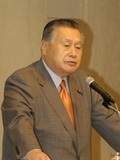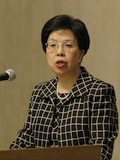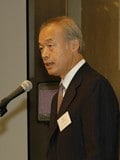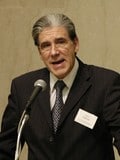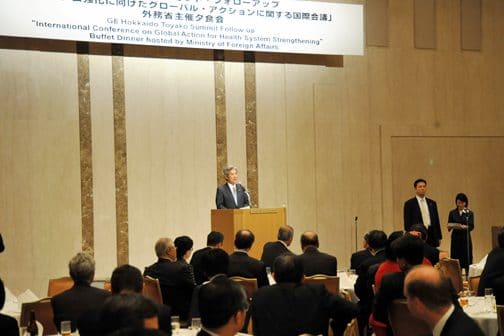A high-level international conference was convened in Tokyo on November 3–4, 2008, to explore the creation of a global strategic framework for strengthening health systems in developing countries around the world, with a particular emphasis on clarifying the role of the G8 in the field. The conference brought together leaders of the world’s major international health–related organizations and health experts from the G8 countries. It was organized by the Working Group on Challenges in Global Health and Japan’s Contributions (Takemi Working Group), the Japan Center for International Exchange, Japan’s Ministry of Foreign Affairs, the Bill & Melinda Gates Foundation, the World Bank, and the World Health Organization, in cooperation with Japan’s Ministry of Health, Labour and Welfare; the Rockefeller Foundation; and the Global Fund to Fight AIDS, Tuberculosis and Malaria. The conference’s opening session featured remarks by former Prime Minister Yoshiro Mori, who chaired the Kyushu-Okinawa G8 Summit in Japan in 2000, the summit that successfully placed global health—and communicable diseases in particular—on the agenda of the world’s wealthiest countries.
Prime Minister Mori’s remarks were followed by an overview of the conference by former Senior Vice Minister of Health, Labour and Welfare of Japan Keizo Takemi, chair of the Takemi Working Group, and keynote speeches by World Health Organization Director-General Margaret Chan; Tachi Yamada, president of the Global Health Program of the Bill & Melinda Gates Foundation; and former Mexican Health Minister Julio Frenk, who will soon take over as the dean of the Harvard School of Public Health. Joy Phumaphi of the World Bank concluded the session with remarks via video. Considering the timing of the conference, in the midst of a global financial crisis, all of the speakers highlighted not only the clear potential negative impacts that the financial crisis could have on global health but also on the opportunities that the crisis presents us with to make bold, innovative investments in health at a time when people are most at risk and when improved health can actually help to address the crisis itself. The speakers also emphasized the importance of primary health care and of human security—as a human-centered approach—as essential driving forces of our efforts in global health. A full summary of the discussions at the conference is provided below.
Monday, November 3 | ||
Opening Remarks | ||
Moderator | Tadashi Yamamoto | President, Japan Center for International Exchange (JCIE) |
Opening Remarks | Yoshiro Mori | former Prime Minister of Japan |
Overview | Keizo Takemi | Research Fellow, Harvard School of Public Health; Chair, Takemi Working Group; Senior Fellow, JCIE |
Keynote speeches | Margaret Chan | Director-General, World Health Organization (WHO) |
Tachi Yamada | President, Global Health Program, Bill & Melinda Gates Foundation, USA | |
Julio Frenk | Senior Fellow, Global Health Program, Bill & Melinda Gates Foundation; President, Carso Health Institute, Mexico; Dean-Designate, Harvard School of Public Health, USA | |
Remarks | Joy Phumaphi | Vice President, Human Development Network, World Bank (via video) |
Session 1: Strategic Framework for Health System Strengthening | ||
Moderator | Richard Horton | Editor-in-Chief, Lancet, UK |
Presentations | William Hsiao | K. T. Li Professor of Economics, Harvard School of Public Health, USA |
Suwit Wibulpolprasert | Senior Advisor, Ministry of Public Health, Thailand | |
Peter Piot | Executive Director, Joint United Nations Programme on HIV/AIDS (UNAIDS) | |
Comments | Shigeru Omi | Regional Director, WHO Regional Office for the Western Pacific (WPRO), Philippines |
Yan Guo | Professor in Health Policy & Management, School of Public Health, Peking University, China | |
Armin H. Fidler | Lead Advisor, Health Policy and Strategy, Health, Nutrition and Population, Human Development Network, World Bank | |
Session 2: Health System Strengthening and Major Stakeholders | ||
Moderator | Sigrun Møgedal | Ambassador for HIV/AIDS and Global Health Initiatives, Ministry of Foreign Affairs, Norway; Chair of the Board, Global Health Workforce Alliance (GHWA) |
Presentations | Keizo Takemi |
|
Michael Reich | Taro Takemi Professor of International Health Policy, Harvard School of Public Health, USA | |
Comments
| Grace Kalimugogo | Head of AIDS Watch Africa; Acting Director, Department of Social Affairs, African Union Commission, Ethiopia |
Christopher Murray | Institute Director, Institute for Health Metrics and Evaluation, University of Washington, USA | |
Gorik Ooms | Post-Doc Researcher, Department of Public Health, Institute of Tropical Medicine, Belgium; former Executive Director, Belgian section of Médecins Sans Frontiéres | |
Julian Lob-Levyt | Executive Secretary, Global Alliance for Vaccines and Immunization (GAVI Alliance) | |
Mari Simonen | Deputy Executive Director, United Nations Population Fund (UNFPA) | |
Christoph Benn | Director, Partnerships, Communications and Resource Mobilization Cluster, Global Fund to Fight AIDS, Tuberculosis and Malaria | |
Pascal Villeneuve | Associate Director, Programme Partnerships, Programme Division, United Nations Children’s Fund (UNICEF) | |
Session 3: Responses from Health Experts | ||
Moderator | Kiyoshi Kurokawa | Professor, National Graduate Institute for Policy Studies; Chair, Health Policy Institute, Japan |
Comments | Eiji Yamamoto | Deputy Director-General for Global Issues, International Cooperation Bureau, Ministry of Foreign Affairs, Japan |
Marcello Fondi | Counselor for Development Cooperation, Ministry of Foreign Affairs; Coordinator G8, Development, Italy | |
Guglielmo Riva | Health Adviser, General Directorate of Development Co-operation, Ministry of Foreign Affairs, Italy | |
Richard Scott Greene | Director, Office of Health, Infectious Diseases, and Nutrition, Bureau for Global Health, U.S. Agency for International Development | |
Tracy Mackenzie-Scott | Second Secretary (Political), British Embassy | |
Viacheslav Smolenskiy | Deputy Director, Department of Science and International Affairs, Russian Federal | |
Martin Pohl | Counsellor for Labour and Health Affairs, Embassy of the Federal Republic of Germany | |
Fabrice Vareille | Counsellor, Political and Economic Section, European Union Delegation of the European Commission to Japan | |
Summation of Day 1 | Richard Horton |
|
| ||
Tuesday, November 4 | ||
Session 4: Presentations and Discussion of Research Team Draft Papers | ||
Health information | ||
Moderator | Christopher Murray |
|
Presentation | Kenji Shibuya | Professor, Department of International Health Policy and Planning, Graduate School of Medicine, University of Tokyo, Japan |
Comments | Ties Boerma | Director, Measurement and Health Information System, WHO |
Octavio Gómez-Dantés | Director of Analysis and Evaluation, Carso Health Institute, Mexico | |
Health financing | ||
Moderator | William Hsiao |
|
Presentation | Ravindra P. Rannan-Eliya | Director, Institute for Health Policy, Sri Lanka |
Comments | Bong-min Yang | Professor of Economics, School of Public Health, Seoul National University, Korea |
Daniel Kress | Deputy Director, Global Health Delivery, Global Health Program, Bill & Melinda Gates Foundation, USA | |
Health workforces | ||
Moderator | Carissa Etienne | Assistant Director-General for Health Systems and Services, WHO |
Presentation | Masamine Jimba | Professor, Department of International Community Health, Graduate School of Medicine, University of Tokyo |
Comments | Lola Dare | Chief Executive Officer, Center for Health Sciences Training, Research and Development, Nigeria |
Edward Mills | Research Scientist, British Columbia Centre for Excellence in HIV/AIDS, Canada | |
Hirotsugu Aiga | Senior Advisor on Health & Nutrition, Japan International Cooperation Agency (JICA) | |
Session 5: Integrated Approaches for Health System Strengthening: A New Architecture for Enhancing Human Security | ||
Presentations | Keizo Takemi |
|
Michael Reich |
| |
Comments | Miriam Were | Chairperson, National AIDS Control Council, Kenya; Laureate, Hideyo Noguchi Africa Prize |
Uche Amazigo | Director of the African Programme for Onchocerciasis Control, WHO, Burkina Faso | |
Eduardo Missoni | Adjunct Professor, Bocconi University, Milan; Chairman, 2001 G8 Genoa Summit Health Experts Group, Italy | |
Young-Soo Shin | Professor in Health Policy and Management, College of Medicine, Seoul National University, Korea; Regional Director-Nominee, WPRO, Philippines | |
Andrew Cassels | Director, Department for Health Systems Governance and Service Delivery, Health Systems and Services Cluster, WHO | |
Discussion |
|
|
Summation & preliminary conclusions | Michael Reich |
|
Remarks | Shinsuke Sugiyama | Director-General for Global Issues, Ministry of Foreign Affairs, Japan |
| Tadashi Yamamoto |
|
OVERVIEW
A high-level international conference was convened in Tokyo on November 3–4, 2008, to explore the creation of a global strategic framework for strengthening health systems in developing countries around the world, with a particular emphasis on clarifying the role of the G8 in the field. The conference brought together leaders of the world’s major international health–related organizations and health experts from the G8 countries. It was organized by the Working Group on Challenges in Global Health and Japan’s Contributions (Takemi Working Group), the Japan Center for International Exchange, Japan’s Ministry of Foreign Affairs, the Bill & Melinda Gates Foundation, the World Bank, and the World Health Organization, in cooperation with Japan’s Ministry of Health, Labour and Welfare; the Rockefeller Foundation; and the Global Fund to Fight AIDS, Tuberculosis and Malaria.
OPENING SESSION
The conference’s opening session featured remarks by former Prime Minister Yoshiro Mori, who chaired the Kyushu-Okinawa G8 Summit in Japan in 2000, the summit that successfully placed global health—and communicable diseases in particular—on the agenda of the world’s wealthiest countries. Prime Minister Mori’s remarks were followed by an overview of the conference by former Senior Vice Minister of Health, Labour and Welfare of Japan Keizo Takemi, chair of the Takemi Working Group, and keynote speeches by World Health Organization Director-General Margaret Chan; Tachi Yamada, president of the Global Health Program of the Bill & Melinda Gates Foundation; and former Mexican Health Minister Julio Frenk, who will soon take over as the dean of the Harvard School of Public Health. Joy Phumaphi of the World Bank concluded the session with remarks via video. Considering the timing of the conference, in the midst of a global financial crisis, all of the speakers highlighted not only the clear potential negative impacts that the financial crisis could have on global health but also on the opportunities that the crisis presents us with to make bold, innovative investments in health at a time when people are most at risk and when improved health can actually help to address the crisis itself. The speakers also emphasized the importance of primary health care and of human security—as a human-centered approach—as essential driving forces of our efforts in global health.
SESSION 1: STRATEGIC FRAMEWORK FOR HEALTH SYSTEM STRENGTHENING
The next session offered various perspectives on the essential elements for a strategic framework for health system strengthening, with presentations from William Hsiao of the Harvard School of Public Health, Thai health expert and advisor Suwit Wibulpolprasert, and Peter Piot of UNAIDS, as well as comments from Shigeru Omi of the WHO Regional Office for the Western Pacific, Yan Guo of Peking University, and Armin Fidler of the World Bank. While the speakers provided diverse perspectives from their wide range of experiences, they all emphasized the importance of looking at the interconnections among the many parts of a health system as well as the ways in which health systems interact with other sectors beyond health. In other words, just like a car or other machinery, fixing only one part will not make the system run if other parts are also broken. The session ended with a call to move the discussion from questions of what we need to do to questions of how to do it.
SESSION 2: HEALTH SYSTEM STRENGTHENING AND MAJOR STAKEHOLDERS
In the afternoon, leaders of other major multilateral institutions, both well established and new, active in the field of global health; civil society representatives; and a representative from the African Union offered their perspectives on the issue of health system strengthening and the challenges that lay ahead for various stakeholders in global health. The session recognized that health system strengthening is high on the global health agenda, while noting that both multilateral agencies and bilateral donors still do not know how to do it effectively. The issue of national leadership and national ownership came up repeatedly throughout the session, and the importance of equity was also highlighted as a major goal of health system strengthening and as something that requires more operational definitions and measures.
There was discussion about the need for better evidence about interventions to improve health system performance, in order to know what works and how to allocate resources more effectively. But, we should not wait until there is perfect evidence before we take action. The global provision of ARV treatment is a case in point, as many lives were saved because stakeholders took a risk on providing ARV in many countries before there was perfect evidence that it could be provided effectively.
SESSION 3: RESPONSES FROM HEALTH EXPERTS
After the presentations by the multilateral institutions, global health experts from G8 countries spoke about the role of the G8 and of its member countries in promoting health system strengthening in developing countries. They all reconfirmed their countries’ commitments to maintaining their support for health improvement in developing countries, particularly given the role of health in driving development. Just as other speakers did in earlier sessions, the G8 health experts emphasized that it is particularly critical to maintain investments in health in this time of crisis. If we fail to do so, we risk undoing the progress that has been made in recent years, and we risk losing millions of lives to preventable illnesses. The G8 health experts also confirmed that they are taking seriously the commitments to accountability and transparency, which their governments made at the Toyako Summit.
SESSION 4: PRESENTATIONS & DISCUSSION OF DRAFT PAPERS
The second day of the conference was dedicated primarily to discussion of the three policy papers that serve as the pillars of this project, each one focusing on a key component of health systems: health information (by Kenji Shibuya), health financing (by Ravi Rannan-Eliya), and health workforce (by Masamine Jimba). The discussion of health information emphasized the need for more global collaboration in order to avoid the fragmentation, duplication, and contradictions that arise in the crowded field of health information. But, this search for unity needs to be balanced with the need for independent, credible information. One central question that still needs to be addressed is how a culture of evidence-based decision making can be created in developing countries. There was general agreement that all stakeholders need to be involved in discussions on what kind of information is gathered and how it is used, from the community health workers who are best positioned to know the healthcare needs of their communities, to the civil society organizations who depend on solid data to back up their advocacy work, to the policymakers who are not health experts but need to be able to use the information to make informed healthcare policies. Through such an inclusive process, information can empower communities and local decision makers in new ways.
The discussion of health financing emphasized the need to use available financial resources more effectively and efficiently but also recognized the need for significantly more funds to come into the health sector. There was general agreement that user fees can impoverish households and deter people from seeking care when they need it, but participants also noted that user fees can provide an important source of financing that is difficult to replace.
Improving the health workforce, the next topic of discussion, is a complex issue that touches on many different aspects of health systems as well as the broader social and political contexts. Participants called for discussions on health workforces to place more emphasis on gender and on South-South collaboration and joint learning. The complexity and magnitude of the health workforce crisis make it difficult for decision makers to effectively address the problems. Recommendations for dealing with the crisis therefore require creative thinking on the part of donor and partner developing countries and a more equal relationship between the two, particularly to encourage creativity on the part of developing countries.
SESSION 5: INTEGRATED APPROACHES FOR HEALTH SYSTEM STRENGTHENING
The final session began with a summation of major themes addressed in the conference, presented by Michael Reich of the Harvard School of Public Health. The session underlined the importance of continuing financial support by the G8 for health improvement in developing countries and the growing consensus on the critical role of health system strengthening along with single disease control programs. Another common theme was the need for better linkages among global, national, and community levels in health system strengthening. There was general agreement on the need for a greater focus on communities and on the people in communities, as the basic unit of a health system, as articulated in the concept of human security. Participants also emphasized the moral imperative of ensuring the basic right of all human beings to health and proposed various mechanisms to achieve this right on a global level. Finally, the session discussed the need to adjust the architecture for global health while finding ways to strengthen the World Health Organization.
The three policy papers on health workforce, health financing, and health information will be revised based on the discussions at the conference, and they will be submitted, along with the overview paper by Keizo Takemi and Michael Reich, to the Japanese government in January 2009. The government will then hand the papers to the Italian government, the host of the 2009 G8 Summit. Summaries of the revised papers, excerpts from the keynote speeches, and the overview paper will also be published in The Lancet in January. The task force will then organize dissemination seminars in both developing and donor countries during the first half of 2009 in order to engage key stakeholders into this ongoing process.

